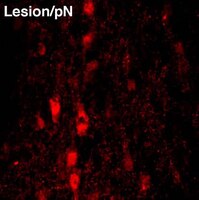Pro-nerve growth factor induces autocrine stimulation of breast cancer cell invasion through tropomyosin-related kinase A (TrkA) and sortilin protein.
Demont, Y; Corbet, C; Page, A; Ataman-Önal, Y; Choquet-Kastylevsky, G; Fliniaux, I; Le Bourhis, X; Toillon, RA; Bradshaw, RA; Hondermarck, H
The Journal of biological chemistry
287
1923-31
2011
Afficher le résumé
The precursor of nerve growth factor (proNGF) has been described as a biologically active polypeptide able to induce apoptosis in neuronal cells, via the neurotrophin receptor p75(NTR) and the sortilin receptor. Herein, it is shown that proNGF is produced and secreted by breast cancer cells, stimulating their invasion. Using Western blotting and mass spectrometry, proNGF was detected in a panel of breast cancer cells as well as in their conditioned media. Immunohistochemical analysis indicated an overproduction of proNGF in breast tumors, when compared with benign and normal breast biopsies, and a relationship to lymph node invasion in ductal carcinomas. Interestingly, siRNA against proNGF induced a decrease of breast cancer cell invasion that was restored by the addition of non-cleavable proNGF. The activation of TrkA, Akt, and Src, but not the MAP kinases, was observed. In addition, the proNGF invasive effect was inhibited by the Trk pharmacological inhibitor K252a, a kinase-dead TrkA, and siRNA against TrkA sortilin, neurotensin, whereas siRNA against p75(NTR) and the MAP kinase inhibitor PD98059 had no impact. These data reveal the existence of an autocrine loop stimulated by proNGF and mediated by TrkA and sortilin, with the activation of Akt and Src, for the stimulation of breast cancer cell invasion. | 22128158
 |
ProNGF induces p75-mediated death of oligodendrocytes following spinal cord injury.
Beattie, Michael S, et al.
Neuron, 36: 375-86 (2002)
2002
Afficher le résumé
The neurotrophin receptor p75 is induced by various injuries to the nervous system, but its role after injury has remained unclear. Here, we report that p75 is required for the death of oligodendrocytes following spinal cord injury, and its action is mediated mainly by proNGF. Oligodendrocytes undergoing apoptosis expressed p75, and the absence of p75 resulted in a decrease in the number of apoptotic oligodendrocytes and increased survival of oligodendrocytes. ProNGF is likely responsible for activating p75 in vivo, since the proNGF from the injured spinal cord induced apoptosis among p75(+/+), but not among p75(-/-), oligodendrocytes in culture, and its action was blocked by proNGF-specific antibody. Together, these data suggest that the role of proNGF is to eliminate damaged cells by activating the apoptotic machinery of p75 after injury. | 12408842
 |










